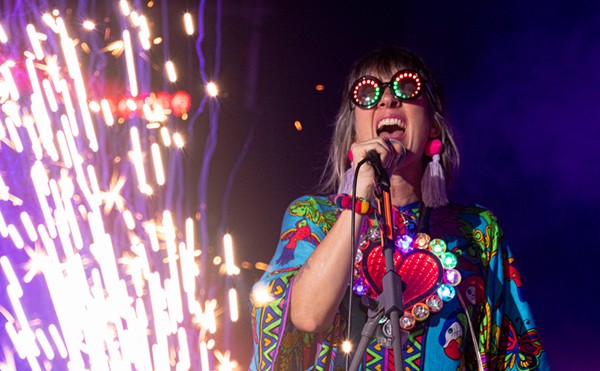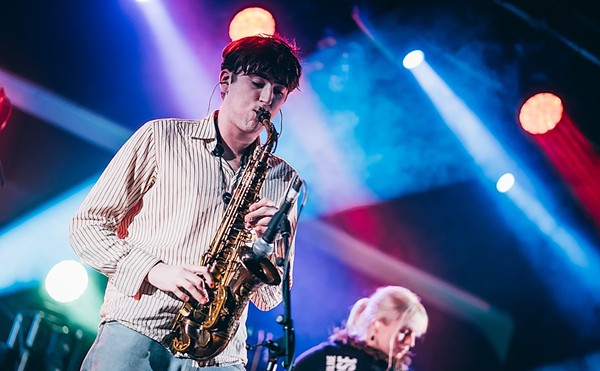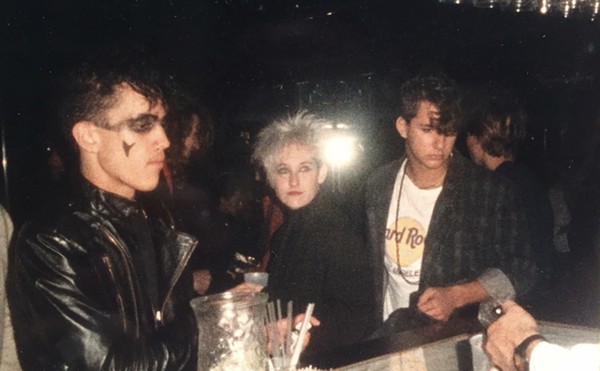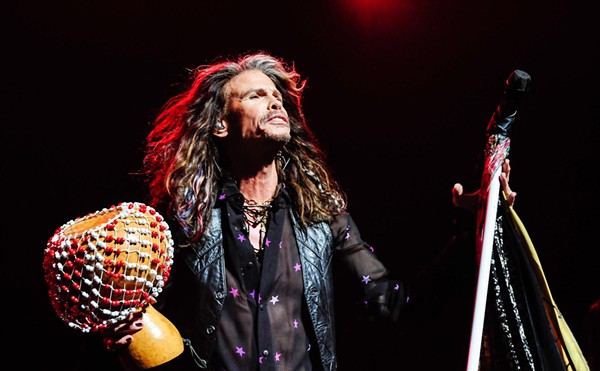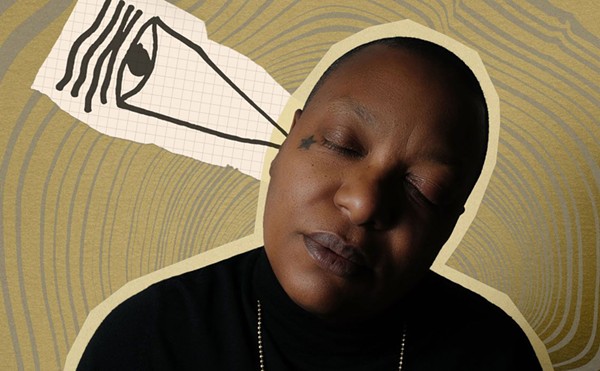You’re a 19-year-old aspiring musician who wants to rescue the San Antonio music scene from its perennial lameness and turn it into, say, the Seattle of the new decade, right? OK, here’s what you don’t do:
1. You don’t bullshit the Strokes’ management team into giving you producer Gordon Raphael’s personal info. Yeah, that Gordon Raphael — the guy who produced the first two albums by the Strokes, including Is This It, chosen by NME as the best album of the decade and by Rolling Stone as the second best, just behind Radiohead’s Kid A.
2. You don’t bug the guy for two years, asking him repeatedly to set up a studio in San Antonio and, when he finally agrees, tell him, “Oh, by the way, can you bring some of your gear from Berlin? We don’t have much stuff in here.”
No, you don’t do that, unless you’re a complete nut. Or your name is Josh Villarreal.
Now 21, Villarreal plays guitar for local band the Lights. Two years ago he wanted to ask Raphael some questions about the vocals in Is This It, so he called the Strokes’ management office and the scam began.
“Hey, is Ryan in?” he asked, even though he had never met the Strokes’ manager. “I misplaced his email. Can you give me Gordon’s email too? I need to talk to him. We’re all supposed to have something going later this year, so … ”
They bought it, and Josh got the info. Thus began a two-year conversation via phone, email, Facebook, and MySpace. Gradually, Raphael became intrigued about San Antonio’s music scene.
“Should I open up a studio?” the producer asked one day, and all Villarreal could do was laugh — suddenly, it all made sense.
“I came to the conclusion that I had nothing to lose,” says Villarreal. “So I sent him an email and said, ‘If you’re serious about opening a studio I want you to know that I can help you and that I’m in 100-percent.’”
“We had a lot of talks, and he was very serious,” recalled Raphael. “But my first thought was, ‘Right, I’m gonna send my gear to complete strangers I’ve never seen in my life and they’re going to steal it and sell it for drugs!’”
But it was something Josh said that made Raphael finally decide. “Gordon,” Villarreal pleaded at one point, “the scene here in San Antonio is covered with gasoline, and we need you to be the match to light it on fire.”
“That’s very poetic, don’t you think?” said Raphael. “That did it for me.” After he finished recording Calendar in Argentina and the Plastics in South Africa, Raphael was ready. He asked Josh to get him some bands to work with and, not surprisingly, they all agreed to work with the famed producer, who later chose Ill Prospekt, Education, Tangible Green, and the Lights to start with.
“OK, I bought a plane ticket,” Raphael told Josh on the phone two months ago. “I’m coming. Let’s do this.”
Read more about Gordon & The StrokesVillarreal honed his skills as a benevolent con artist by paying close attention at the hotel where he works. “At the hotel, I watched every single person that came in and observed how business people talked,” he says. “I’d asked them about the economy, and what does this all mean? And I’d listen, and watch them, and watch my managers, and the accounting department, and see how they used their business strategy to make things happen. And I said, you know what? Fuck it. I can do this. So I put a team together and decided to do like a hotel site inspection. We’re going to make Gordon love it here.”
Raphael arrived in San Antonio on December 8, and Josh had everything ready for him. He put together “Team Gordon,” as he calls it, a group of 20 or so local musicians and friends who all pitch in so that Raphael can have a place to stay, work, and have a good time. The group includes the A-Team, a group of four stunning-looking marketing girls whose names, coincidentally, all start with an A, and whose job it is to wear Gordon Raphael T-shirts, follow him around, and tell people about him.
On December 10, I meet Raphael at the studio he set up near 281 and Nakoma, where he’s working on Education’s first full-fledged album.
The players from Education seemed at ease around him. “It’s very easy to communicate with him and get along,” says Brian Baker, who plays guitar and bass for Education. “He makes you comfortable. And what we’ve recorded so far is awesome. It sounds great, and we haven’t even mixed anything yet.”
“`Gordon` hears things no one else hears,” says drummer Alton Jenkins.
“Last year I was listening to Is This It and thinking, ‘Wow, it would be nice to be produced by the guy who produced this album,” says Josh Huval, singer and guitarist for Tangible Green. “Now it’s happening. Unbelievable.”
“Most of the stuff I hear around the world, or in the radio, or in the media, just upsets me how bad it is,” says Raphael. “But for some reason, whenever I get calls from bands the music is quite good.”
That was the case regarding the three bands he’s beginning to work with.
“I come from listening to long pieces of music and things with improvisation and space in them, and I heard that in all three bands, even though they’re quite different,” says Raphael. “Ill Prospekt does it with electronics, a groove, and a trance space; Education does it with a kind of rock ’n’ roll with a Southern flavor, almost like a modern indie Allman Brothers kind of vibe. And I like Tangible Green because the songs I heard were very organic and evolving and have improvisational elements in them. It felt really free and I liked their style.”
Team Gordon’s idea is to establish the studio so that local bands can record with him, ultimately making the studio a self-sufficient endeavor. Raphael has committed to staying in SA until mid-January, but everything else in Planet Gordon is up for grabs.
“If I’m only here for a month, the studio will last a month,” he says. “If I’m here for three months, it’ll last three months. If it seems that the scene can support a studio, I’ll make a studio and leave it here and come back whenever I need to. By that I mean that I can take some of my gear back and they can get replacements of their own and the studio can make enough money to survive without me.”
Despite his easy-going, playful nature, he’s dead serious about the music. He doesn’t believe the “in music, everything has been invented” mantra. “Bands try to be like other people, forgetting that the main object of creativity is trying to find what’s special about yourself,” he says. “I’m always looking for music that I haven’t heard before, and I always find it. It’s not impossible. We’ve been using the same scale for hundreds and hundreds of years, and there’s always a band that comes up with a new way to make a melody, or a new beat, or a new sound, or a new set of lyrics, even new ways to dress! I’m really into originality and I think too many bands don’t try to be original.”
But why San Antonio, Lame Capital of America? Why not do this in a proven music capital instead of taking unnecessary chances? The way Gordon sees it, that’s precisely why: there’s a scene to be made here. And, as a native of Seattle, the capital of the ’90s grunge explosion, the Gordon Raphael/SA pairing is a potential match made in heaven.
“‘Keep San Antonio Lame’? I like that!” he says, laughing. “I come from Seattle, and our slogan in the late ’80s and early ’90s was ‘Loser.’ So you’re lame and we’re losers. We can make a scene here. I like scenes. I remember when the `’90s grunge explosion` happened in Seattle, it felt so good to have people working together and bands helping each other. It’s a good feeling and I haven’t felt it since then.”
A couple of hours after my first interview with Raphael, the crew regroups at Vintage House, a Southtown clothing store owned by Villarreal and his wife, where Tangible Green and Ill Prospekt are slated to play as a sort of welcome party for Raphael, who would also do some DJing. Midway through their second song, “Tree Song,” Ill Prospekt was loud and smoking — so much so that smoke started coming out of one of the speakers. In a few seconds, flames appeared, and people began yelling, “It’s on fire! It’s on fire!”
A euphoric and clueless Raphael (who, I assume, wasn’t referring to this when he said he wanted to set the scene on fire) had just emerged to tell me how the band had set their speaker on fire earlier at the studio. After a few moments, his jaw dropped. “They did it again?!”
After the fire was extinguished, he patiently explained how the group can solder a cheap fuse to the speaker to help avoid more meltdowns. For the rest of the night it was all DJ Gordon, playing everything from Traffic to Bowie to Pearl Jam. Ultimately, when the smoke of Ill Prospekt’s speakers and Raphael’s sudden appearance in SA clears, it all comes down to the music.
Personally, I don’t give a feral hog’s ass about “scenes.” Austin is better known for the amount of concerts, festivals, and live venues than for the actual quantity of musical masterpieces it produces; even Seattle went back to loser status soon after the ’90s grunge explosion died down. I would trade great albums for a scene anytime. And that’s where Gordon Raphael can come in handy. His proven record of turning in solid albums on shoestring budgets, and the great chemistry he seems to have with some of our local bands could well be the beginning of a new era for rock in San Antonio.
“I definitely lit the match,” said Raphael on December 13. “I worked with Education for the last four days and we almost finished a 10-song album, and it’s really good. And I think when people hear this record a lot of them are going to want to come and record with me here, and Education will get a lot of respect and power to get their music out into the world. They’re a really good band and the songs are amazing.”
From here, either Raphael sets up a more permanent shop in San Antonio, or his disciples continue with what he started, or the whole venture crumbles: Raphael takes his plane back to Berlin, and San Antonio remains gratefully lame. Or …
No matter which way you look at it, Raphael’s presence in San Antonio should, at the very least, produce Our Own Private Magical Moment, even if it’s a fleeting one. After all, that is what Raphael is all about: he’s a master of finding gold where (and when) you least expect it, and in the least amount of time. If you want to do take after take after take, get someone else. “As a musician, I find that the first time I play a song it’s ecstasy,” he said. “The second time, I’m studying it a little bit, I’m thinking about it. The third time it feels like a job, and the fourth time I’m angry.
“I want to catch it while it’s ecstasy.” •




